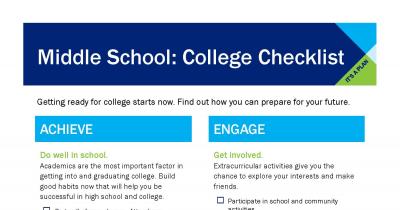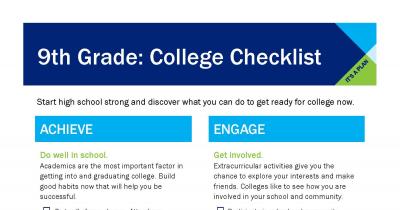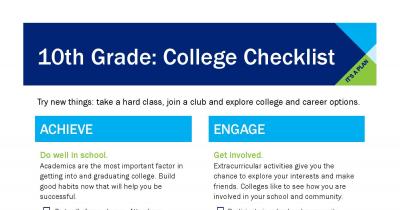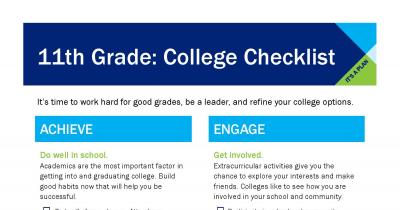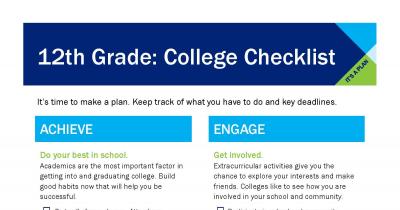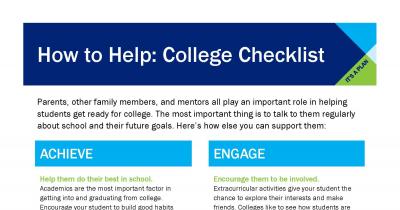
Parents, other family members, and mentors all play an important role in helping students get ready for college.
College preparation timeline
Getting ready for college starts now. Here's an overview of what your student should be doing in each grade.
Family and mentor college preparation checklist
Here's how to help your student get ready for college. The most important thing:
Talk to your student regularly about school and their future goals.
Share your hopes and expectations, but be open and encouraging towards your student’s goals. Ask open-ended questions about your student’s classes, interests, and plans for the future. Start the conversation using the questions within the checklist.
Encourage your student to build good habits now that will help them be successful.
- Be vocal about your expectations for school. Ask questions about your student’s classes, teachers, and assignments.
- Help them find a system that works for them to keep track of class material, assignments and deadlines.
- Make sure your student goes to all their classes and turns in all assignments.
- Talk to teachers and other school staff about your student’s progress.
Conversation starters
- What are your goals for the school year? What are your plans to achieve these goals?
- What is one cool thing you learned today at school?
Your student should take a full schedule of classes, including ones that are interesting, challenging, or ideally, both. Colleges would rather see respectable grades in challenging courses than amazing grades in easy classes.
- Talk to school staff to make sure your student is on track to graduate and prepared for college.
- Encourage your student to take challenging classes, including those that may offer college credit.
Conversation starters
- What is your favorite class in school? Why?
- What is the most challenging class in school? Why? Who can you ask for help?
- JUNIOR FALL: Encourage your student to take the PSAT/NSMQT to qualify for scholarships.
- JUNIOR FALL: Encourage your student to take free practice tests and learn helpful tips for the SAT or ACT.
- JUNIOR SPRING: Remind them to sign up for and take the SAT or ACT.
- SENIOR FALL: Remind them to sign up for and take the SAT or ACT if they haven’t yet or want to re-take it.
Conversation starters
- Are you planning to take the ACT or SAT? Why or why not?
- What are you doing to prepare for admissions tests?
Although not required, colleges like to see how you are involved in your school and community.
- Encourage your student to participate in school and community activities during the school year and summer. These include sports, school clubs, volunteer work, part-time jobs, and/or family responsibilities.
- Quality is better than quantity. Colleges like to see you do the same activity for many years and/or take on a leadership role.
Conversation starters
- Which of your activities do you enjoy the most?
- What are your goals for the summer?
Who your student hangs out with matters!
- Get to know your student's friends and their parents. Encourage them to choose friends that share positive goals and interests.
- Help your student find a mentor – a parent, teacher, counselor, coach, other trusted adult or older student that they can talk to.
- Encourage your student to be a role model and mentor for younger students.
Conversation starters
- Who did you eat lunch with today?
- Who is your favorite adult at the school? Why?
- Which adult has had the biggest impact on your life? What is something you've learned from him/her?
- What are your favorite ways to spend time with our family?
- Help them take care of their physical and mental health. Encourage them to exercise, eat healthy, and sleep well.
- Remind them to be safe online and on their phone.
- Share your expectations and the risks of drinking, doing drugs, and having sex.
- Model being kind and treating others with respect.
Conversation starters
- When you're feeling stressed, what is something that helps you relax?
- Who do you talk to when you're feeling down?
- How do you show friends you care about them?
Your student can go to college. There are countless possibilities when it comes to both college and career.
- Talk to them about careers they are interested in and the education they will need to be successful.
- Get to know the different types of colleges. Take a virtual tour or if possible, visit a college campus with your student.
- Help them think about what is most important to them in a college. Ask them to share their list of 5-10 colleges that match their needs.
Conversation starters
- Why do you think you may or may not want to go to college?
- What do you imagine yourself doing in 10 years? How will you get there?
- What job or career sounds interesting to you? What kind of education/training do you need?
- What is important to you in a college? What colleges are you interested in and why?
- What would be your perfect college? Are you interested in going to a big or small school? Rural, urban or suburban?
- Learn the ways to pay for college.
- Estimate what your student will actually pay by using the Federal Student Aid Estimator and a net price calculator.
- Set up and regularly contribute to a college savings account.
- Encourage your student to make a list of scholarships and apply for any available to them now.
Conversation starters
- What have you learned about the cost of college?
- Can you explain to me the sticker price v. the net price of colleges with an example?
- What have you heard about student loans?
Knowing how to get ready for college can be confusing.
- Have your student use Oregon Goes To College’s checklists and templates to stay organized.
- Help your student create a file of important documents and list of activities. Include copies of report cards and lists of awards and honors.
- Encourage them to create and use a professional e-mail for all college-related activities.
- You and your student can connect with a counselor, teacher, mentor, or other program in your school or community.
Conversation starters
- What is something you've done in high school that you're particularly proud of?
- Ask them about their final list of 4 – 6 colleges that will be a good fit for them.
- Encourage them to be prepared with all of the information they need which could include taking admissions tests or writing essays. Ask them if they need information from you like employment history or residency information.
- Congratulate your student on taking the first step and applying to college!
Conversation starters
- What colleges are you applying to? What makes them a good fit for you?
- How can I support you in applying to college?
- Ask them which financial aid applications they will need to complete and what information they need from you. Encourage them to apply as early as possible.
- Encourage them to set aside time each week to apply for scholarships. Parents can ask their employers or other organizations if they offer scholarships for their students.
- Compare their financial aid offers from colleges carefully.
Conversation starters
- Which financial aid forms do you need to complete? How can I help you?
- What is the coolest scholarship you are applying to?
- What kind of job might you want to have during college to help pay for your expenses?
- Help them think carefully and critically in deciding where to go to college.
- Support them in getting ready for college and filling out forms including accepting financial aid, attending orientation, and registering for classes.
- Encourage them to start practicing what it takes to be a successful college student.
- Learn where they can get help on campus.
Conversation starters
- How will you make your decision about where to go to college?
- What are you most looking forward to about college? What makes you nervous?
Download checklists for every grade
Help your student stay on track. Save or print the college checklists you need.

